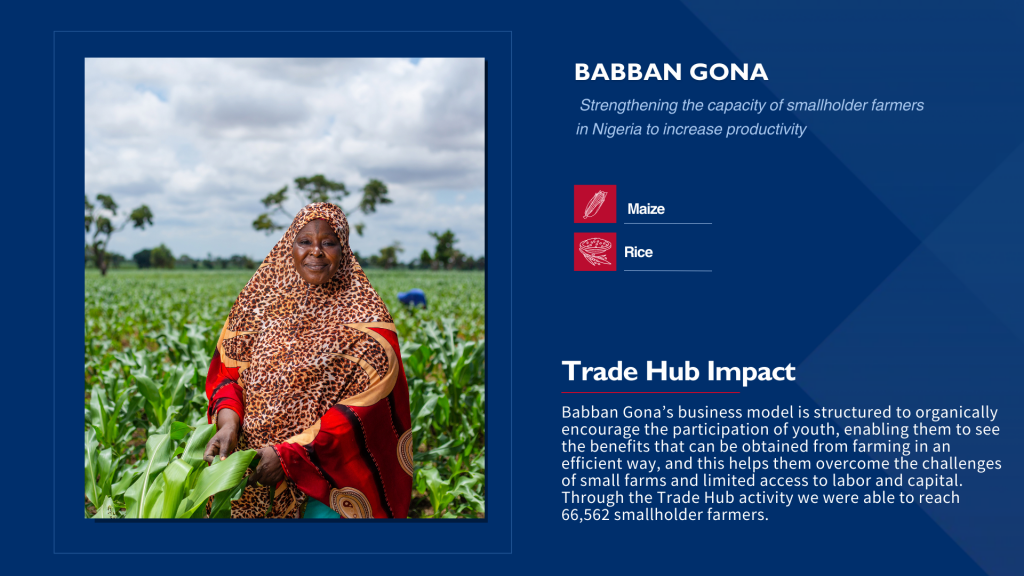The Challenge
Maize and rice remain the most sought-after staple foods in Nigeria, with the maize farming sector accounting for 5 percent of the country’s gross domestic product. Although the quantity of milled rice produced in Nigeria increased steadily over the past decade, reaching 5.4 million metric tons in 2022, nevertheless production of maize and rice is still falling short of demand. In addition to a lack of adequate processing and storage facilities, smallholder farmers face difficulties in accessing improved seeds, other high-quality agricultural inputs, and adequate post-harvest services that could help them maximize their outputs and secure reasonable incomes.
The Grant
Through its COVID-19 rapid response initiative, the USAID-funded West Africa Trade & Investment Hub (Trade Hub) awarded a $500,000 grant to the Nigerian-based social enterprise Babban Gona, whose name means “great farm” in the Hausa language. The grant enabled Babban Gona to leverage approximately $15.4 million in private funds to strengthen the capacity of 56,000 smallholder farmers in Nigeria, to produce 90,000 metric tons of maize and rice, and to provide mechanical threshing services at harvest for half of the participating farmers (28,000 smallholders). About a third of the farmers (18,000 smallholders) are based in focus areas for USAID’s Feed the Future initiative: Kaduna, Benue, Cross River, and Niger states.
The Impact
Through this partnership with the Trade Hub, Babban Gona provided access to a comprehensive suite of products and services to dramatically increase yields on smaller-sized farms. Young smallholders were provided with a simplified platform that enabled them to access financial credit, training, agricultural inputs, markets, and cost-saving technology solutions in a cooperative format, thus increasing their yields and profit.

By making agricultural business simpler, more affordable, and more profitable to operate, Babban Gona attracted youth, who comprise more than 50 percent of smallholder farmers in Babban Gona’s portfolio. In February 2023, Babban Gona completed its co-investment project. Within 20 months of implementing its activities, Babban Gona supported 66,562 farmers in cultivating maize and rice, reaching 18 percent more farmers than the target. To help smallholders preserve maize longer with less waste, the company introduced the GrainPro Cocoon impermeable sealed bag that keeps out insects and inhibits fungal growth. Procuring 193 of the bags, Babban Gona helped smallholders in northern Nigeria ensure high-quality maize storage techniques that fetched better prices in the market.
Supporting women farmers, the project reached over 150,000 women by building their capacity in business and financial literacy with a focus on poultry farming. The grant also supported 13,400 women with start-up packages to launch small-scale poultry businesses. In other key impacts, the project provided access to $35 million in agriculture-related financing for smallholders; cultivated 44,900 hectares using best agronomic practices and improved technology; and ensured quality preservation of over 140,000 metric tons of grain to reduce post-harvest losses.

